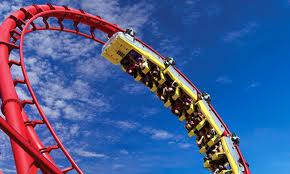I began my Countdown to Halloween pondering the question of why we love horror movies. I wrote about the "horror paradox", a phenomenon where, although we find the horrific to be repulsive, we pay good money to watch it again and again. This is not a new question; it's as old as Aristotle, who addressed disgust as an emotion. Why do we enjoy ugly things? Why do we enjoy tragedy?
I've explained in previous posts that people watch horror movies as a way of coping with actual fears or violence in the world in which we live. That is a sound theory when you examine various decades in which horror movies were produced. But now I want to take a different approach and attack the question from a more specific psychological angle, independent of time and era.
Enjoying the Rush
In the excellent documentary, Nightmares in Red White and Blue, legendary director John Carpenter (Halloween, The Thing) says, "Fear is probably the most powerful emotion we feel as humans. The things we see in horror movies are what we're afraid of." Rather than environmental or psychological reasons for subjecting ourselves to horror, Carpenter suggests a physiological reason. And he's not the only one.
New York University neuroscientist Joseph LeDoux mapped out neuron by neuron how the brain's fear system works. For those who like the genre, a good horror movie arouses a cocktail of chemistry in the cerebral cortex, the part of the brain that controls memory, perception and consciousness. But it's not just movies, it's also fairy tales, books and amusement park rides that simultaneously elicit both pleasure and fear.
Researchers and thrill-seekers know that people can experience fear and euphoria at the same time. Psychologist Frank Farley says that those who thrive on fear "like uncertainty, suspense, unpredictability, the unknown. Uncertainty is the prime source of fear. You don't know what's going to happen." Movie makers know how to induce fear. "There is intensity of stimulation. It can be the sound of screams or the visual – something comes out of nowhere into the face…" Another was to say this is that horror movie fans are happy to by unhappy. The most fearful moments may actually be the most pleasant.
As I've said before, not everyone likes being scared. Farley says that how a person responds to fear is physiologically wired in their personality. So who's wired for it and who's not? There's a theory that only people who have never experienced true fear and terror like it. Those who have, never want to revisit it. There's also a study that says those who have a relatively calm, uneventful lifestyle seek out something exciting because our nervous systems need it. Horror movies are one of the better ways to rev the engines.
We can get very philosophical about fear, also. Aristotle said that the cognitive payoff counterbalances the negative experience. And Sigmund Freud suggested that if our brains sense a sudden demobilization of energy mobilized for some action in the outer world, when that energy is released, we feel pleasure. We know before we see a horror movie that we will be scared; however, we also know that afterwards we will feel a release of that tension.
There's one other theory that gets a little deep for me. It says that fear is not merely a biological reaction, but an emotion derived from both deep-seeded evolutionary factors as well as newly learned cautions. Conversations between the primitive brain and the more recently acquired cerebral cortex allow humans to interpret an environmental event and respond with an emotion such as fear. Jung argued that horror touches on primordial images in the collective unconscious.
I prefer a more simple explanation. You physically experience an adrenaline rush when you're scared and it feels good when it's released. Ultimately, pleasure comes from fear.
That's one reason when an audience in a crowded theater experiences this release at the same time, it's followed by laughter. And that's one reason it's more fun to see a horror movie in a full house.That's one theory, anyway. Join me in the remaining days of Countdown to Halloween to explore others...



No comments:
Post a Comment